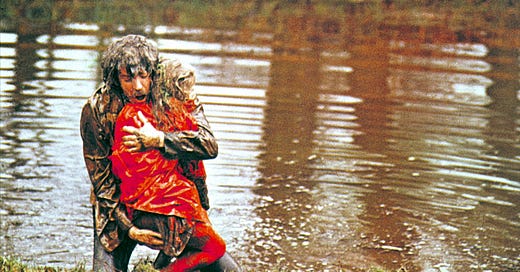We’ve got five years, stuck on my eyes
Five years, what a surprise
We’ve got five years, my brain hurts a lot
Five years, that’s all we’ve got
Great love of my life - the tide draws closer, surreptitiously so. Enter: an unbridled wave, sage, brown and blue. I am sprawled at the muddy shore, limbs spun with seaweed, allowing my body to be baptised. Palms upturned and open - there is dirt beneath my fingernails. As the water envelopes my flesh, I feel the sting of saltwater flood generously into my heart. The pain is a sword of silver, thrust forcefully through my ribcage. The sadness, dear reader, bathes me in waves. Sewage sloshes in my lungs.
Donald Sutherland in Don’t Look Now (1973) dir. Nicolas Roeg.
Moments earlier I was stood, eyes wafting over birds of prey eager to pull apart flies and fruit, when my gaze settles upon a lone visitor. Similar height, build, and soft tussles of silver curls. Blood floods to the surface. My eyes well, and, with body frozen in fever, underneath a spell of sorrow I am overcome with an urge: to embrace him. In seeing figures in the street, the station, the gallery, that look like him - him, reader - I can’t determine whether God is pulling him back to me.
In recent days, I have come to recognise the term ‘tragicomedy’, a genre of literature which encompasses elements of pathos and humour in equal measure, foremost lending itself to traditions in ancient Greek theatre. Tragicomedy, my love, is an otherworld I feel perpetually trapped inside of. When I pick apart my prose and dig down into the gristle of it all, I realise that a glimmer of gallows humour is ever-present, wriggling around like a parasite in my peripheral vision.
Finding joy amongst the horror, my unending adoration for comedy, in particular the bygone era of British comedic television (slapstick, droll and drama alike) stems from my Father. Dry and melodic Irish wit, just to take the edge off. Carry On Screaming, Some Mothers do ‘Ave ‘Em and Monty Python… “We are the knights who say ‘Ni!’”
Ernie Wise, Eric Morecambe and André Previn in The Morecambe and Wise Show 1971 Christmas Special.
When I think of comedy, I look back to the musical delights of Morecambe and Wise. The double act, beginning their respective careers in vaudeville theatre along the coast of England’s seaside towns (see: Morecambe, a moniker bearing reference to the beach resort of the same name), were celebrated for their catalogue of televised routines, broadly spanning from the early Sixties to the early Eighties.
Pictured above, my love, an image still from the duo’s (arguably) most notable work. The sketch depicts Ernie Wise, typically prudish, alongside an incensed Eric Morecambe as he berates composer André Previn for not conducting the music to his liking. Previn, leading the orchestra, signals a cue for Morecambe to play the piano, which he inevitably misses through leisurely sauntering across the stage, gesturing to his audience. On second try, Previn again looks to Morecambe, at which he abruptly belts “Great!”, suddenly clunking piano keys with careless whimsy. Eric lingers behind, lips pursed to prevent laughter.
Confronted with distain, Previn proceeds “You’re playing all the wrong notes.” Morecambe, theatrically so, tautly tugs at Previn’s lapels with two white-knuckled fists. In a clipped Lancashire tone, jaw jutting in faux anger, Morecambe mutters: “I’m playing all the right notes - but not, necessarily, in the right order.” Applause erupts with belly-laughter bursting from the audience, spilling out onto the plush Seventies stage.
David Bowie performing Five Years from the album Ziggy Stardust and the Spiders from Mars (1972) on The Old Grey Whistle Test.
Speaking of stages, purportedly, there are five known stages of grief, coined by psychiatrist Elisabeth Kübler-Ross in the late 1960s. They are articulated as the following: Denial, Anger, Bargaining, Depression and Acceptance. If there’s anything I’ve found my love, in my time of dying, is that no two experiences of loss are ever the same, let alone linear. Much like Morecambe, I continue to endure each of these stages, but not, necessarily, in the right order. I deign to pull at Death by the cloak hood and whisper blaspheme through gritted teeth.
Strangely enough, dear reader, my most pretty-ugly-cry response to death was following the loss of David Bowie six years ago. On a wintry January morn, I awake to the whir of woe on Radio 6. Weeping and whining, ‘parasocially’ so, I remember pacing the corridor of my student accommodation, hysterical. My devastation was palpable, for, because of Bowie, I finally felt understood. Ziggy Stardust, Aladdin Sane, Halloween Jack and the Duke, to me, are all iconic bastions of queer culture - for the freaks and geeks and lovers in tow.
I was introduced to Glam Rock, rippling guitar riffs and stomping platform boots through, predictably, Dad - who from this point forth I may refer to as Stephen simply to cease annoying the fuck out of you. Sat slumped on my bed after school, ‘doomscrolling’ through Tumblr, I hear him gently tapping at my door. Glaring in retaliation, having my oh-so-precious personal time whittled away, he says softly “Look ‘ere, get on that ‘YouTube’, let me type something in.” That something, my love, was this. Five Years, the time that Stephen held out for.
I saw full colour for the first time, fell in love beneath the gloss of green stage light, and, whilst Bowie’s elaborate garb sits stored away in V&A museum archives, lint-rolled and temperature controlled, Stephen’s coat, worn almost every working day until death, rests neatly folded away in my wardrobe.
Take care, speak soon.
X







